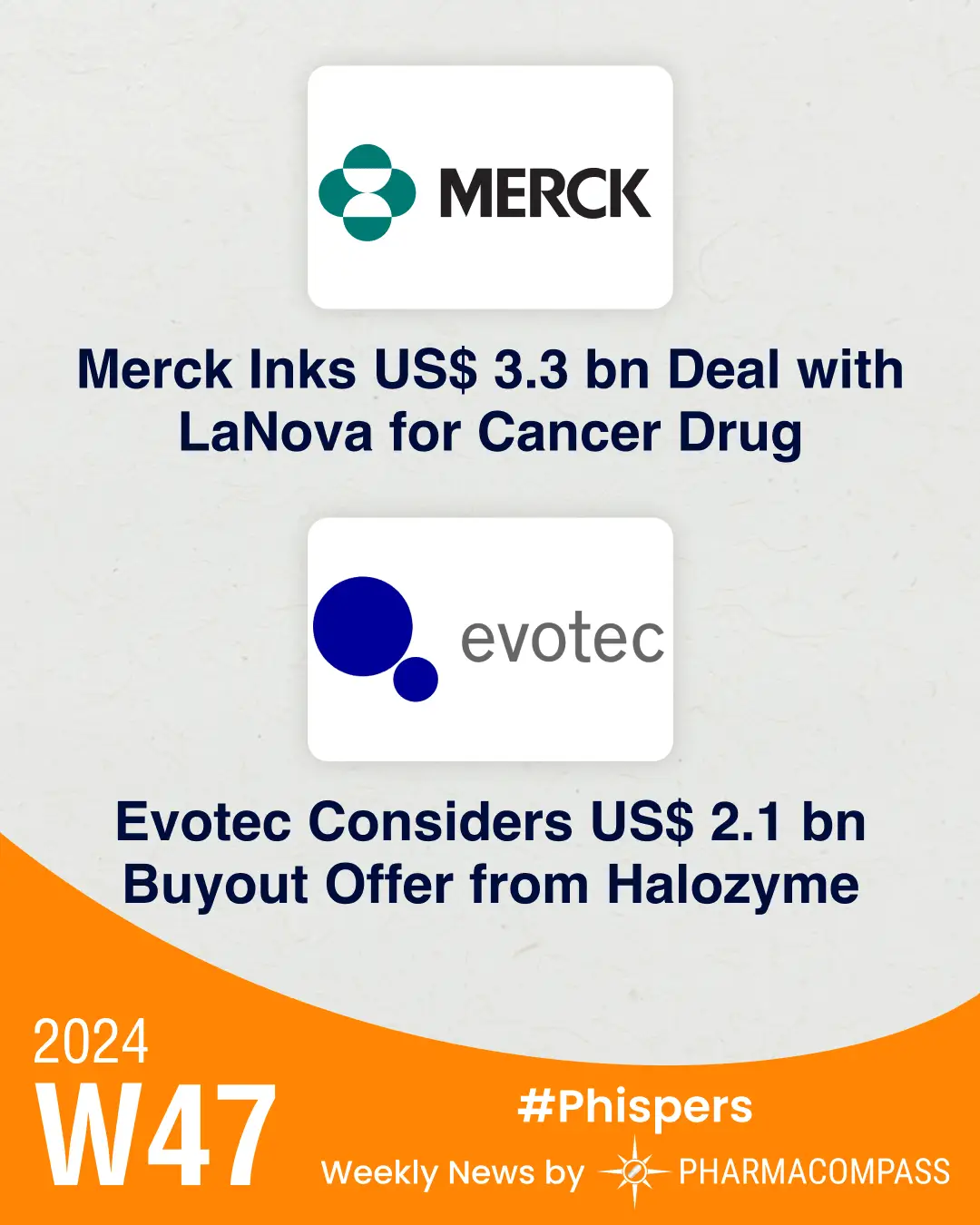
By PharmaCompass
2024-11-21
Impressions: 1,118 (Article) || 23 (Video)
This week, Merck struck a strategic US$ 3.3 billion deal with LaNova Medicines for a promising cancer drug, and also demonstrated the potential of a subcutaneous formulation of Keytruda that could protect its market exclusivity.
Syndax Pharmaceuticals made history by securing the first approval from the US Food and Drug Administration (FDA) for a new class of drugs to treat complex blood cancers. Azurity received approval for Danziten, a more patient-friendly version of Novartis’ leukemia medication.
Vaccine manufacturers’ stocks experienced a downturn following Donald Trump’s selection of Robert F. Kennedy Jr., an anti-vaccine activist, as potential health secretary.
In clinical trials, GSK demonstrated success with linerixibat, an experimental therapy addressing relentless itching in primary biliary cholangitis. And Johnson & Johnson announced impressive results for its oral psoriasis medication icotrokinra.
In deals, Evotec is evaluating a US $2.1 billion buyout offer from Halozyme. And in regulatory news, FDA has placed an import ban on China’s Tianjin Darentang Jingwanhong and also issued it a warning letter for refusing an inspection.
Merck inks strategic deal with China’s LaNova for up to US$ 3.3 bn for cancer drug
Merck has entered into a licensing agreement with China’s LaNova Medicines for the investigational cancer drug LM-299, committing up to US $3.3 billion. This innovative bispecific antibody targets two critical proteins — PD-1, which plays a role in preventing the immune system from attacking cancer cells, and VEGF, a protein that can promote tumor growth.
The interest in PD-(L)1xVEGF bispecific antibodies has skyrocketed, particularly after a pivotal trial in September where ivonescimab, developed by Akeso and Summit Therapeutics, outperformed Keytruda in terms of survival rates. Just last week, BioNTech had announced its acquisition of China’s Biotheus to gain access to a similar bispecific antibody.
Germany’s Evotec evaluates US$ 2.1 bn offer from Halozyme: Evotec is evaluating a buyout proposal made by Halozyme Therapeutics, valuing it at approximately € 2 billion (US$ 2.1 billion). The move aims to expand Halozyme’s capabilities beyond its established drug delivery technologies. Days earlier, private equity firm Triton was also reported to be exploring a potential buyout of Evotec after confirming it has raised its stake in the company to nearly 10 percent.
Vaccine makers’ stocks tumble after Trump picks RFK Jr. as health secretary
Following Donald Trump’s selection of Robert F. Kennedy Jr., an anti-vaccine activist, to lead the Department of Health and Human Services (HHS), shares of several vaccine manufacturers fell. In the US, stocks of Pfizer, Moderna, and Novavax dipped. In Europe, stocks of BioNTech, GSK, and Bavarian Nordic tumbled. The HHS oversees health programs, including Medicare and Medicaid.
Trump has also nominated Mehmet Oz, a celebrity TV host, to run the Centers for Medicare and Medicaid Services (CMS), which oversees health insurance. It has a budget of US$ 1.6 trillion, 25 percent of the entire federal budget. Meanwhile, according to Reuters, Trump is likely to choose Johns Hopkins surgeon and writer Martin Makary to head the FDA.
Syndax wins first FDA nod for new class of leukemia drugs
FDA has granted approval to Syndax Pharmaceuticals’ Revuforj (revumenib), marking a significant advancement in the treatment of relapsed or refractory acute leukemia with a KMT2A translocation. This chromosomal rearrangement, involving the KMT2A gene, is found in about 10 percent of acute leukemia patients. Revuforj is the first and only menin inhibitor to receive FDA clearance, providing a new therapeutic option for both adult and pediatric patients aged one year and older. This approval marks the second FDA nod for Syndax this year for a first-in-class drug.
Azurity’s leukemia med without fasting restrictions okayed: FDA has approved Danziten (nilotinib), a groundbreaking formulation of Novartis’ blockbuster Tasigna that allows patients with chronic myeloid leukemia (CML) to take their medication without having to fast. Danziten is indicated for adult patients with newly diagnosed Philadelphia chromosome-positive chronic myeloid leukemia in chronic phase, as well as for those who are resistant or intolerant to prior therapy that included chemotherapy Gleevec (imatinib).
Jazz’s Ziihera bags accelerated nod: Jazz Pharmaceuticals has received accelerated FDA approval for Ziihera (zanidatamab-hrii), for previously treated adults with HER2-positive biliary tract cancer (BTC) that has spread or is inoperable. Ziihera is the first and only dual HER2-targeted bispecific antibody for this indication, demonstrating a 52 percent objective response rate.
UCB’s Bimzelx bags fifth FDA nod: UCB has received FDA approval for Bimzelx (bimekizumab-bkzx), making it the first and only therapy that selectively inhibits two proteins, IL-17A and IL-17F, for adults with moderate-to-severe hidradenitis suppurativa. This approval represents the fifth indication for Bimzelx in just over a year.
Under-the-skin injection of Merck’s Keytruda found to be on par with IV version
Merck said its subcutaneous formulation of Keytruda (pembrolizumab) has successfully met the primary endpoints in a phase 3 lung cancer trial, demonstrating non-inferiority to the currently approved intravenous version. This injectable version, which can be administered in about 2-3 minutes, offers a more convenient alternative to the traditional IV method. This development is particularly significant as it could potentially protect Keytruda’s market exclusivity.
J&J’s oral skin disease drug scores late-stage win: Johnson & Johnson’s oral drug icotrokinra has successfully met its primary goals in a late-stage trial for treating moderate-to-severe plaque psoriasis. Icotrokinra works by selectively blocking the IL-23 receptor, a key player in inflammatory responses.
GSK’s relentless itch drug meets primary goals: GSK said its experimental therapy, linerixibat, has met its primary goals in a late-stage trial for treating relentless itching associated with primary biliary cholangitis (PBC). If approved, it could become the first global therapy specifically indicated to treat the relentless itching.
FDA busts Chinese drugmaker’s attempt to hide data in warning letter
The FDA caught Chinese drugmaker Tianjin Darentang Jingwanhong hiding information during a March 2024 inspection, after “top management” ordered staff to conceal manufacturing data. The company had removed key details from translated manufacturing records and outright blocked FDA inspectors from photographing deteriorated equipment – including machines held together by cracked bands, with missing screws and broken panels.
Moreover, there was no analytical method in place to test the stability of an unnamed drug that had already been shipped to the US. FDA shot off a warning letter, slapped Tianjin Darentang with an import ban and a 15-day deadline to address the issues or face the risk of having future drug approvals blocked.
The PharmaCompass Newsletter – Sign Up, Stay Ahead
Feedback, help us to improve. Click here
Image Credit : Phisper Infographic by PharmaCompass license under CC BY 2.0
“ The article is based on the information available in public and which the author believes to be true. The author is not disseminating any information, which the author believes or knows, is confidential or in conflict with the privacy of any person. The views expressed or information supplied through this article is mere opinion and observation of the author. The author does not intend to defame, insult or, cause loss or damage to anyone, in any manner, through this article.”







